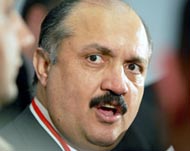Three Sunni MPs quit dominant alliance
Three key Sunni Arab lawmakers have resigned from the dominant United Iraqi Alliance.

The three, Fawaz al-Jarba, Mudhar Shawkat and Abd al-Rahman al-Nuaimi, announced their resignation on Tuesday from the United Iraqi Alliance (UIA) which is led by Abd al-Aziz al-Hakim, Aljazeera learned.
The three members of parliament said they were resigning in protest against the attempt to marginalise Sunni Arabs. They also expressed resentment against what they called foreign interference in ministry-making decisions.
The three Sunni MPs had fought the 30 January elections on the UIA platform which won 140 of the 275 seats. Al-Jarba was in the running for vice-president before Ghazi al-Yawir was chosen for the post.
Meeting held
Their decision to quit came as the five-man committee representing Sunni Arabs and headed by al-Yawir held a meeting with Prime Minister-designate Ibrahim al-Jafari to review allocation of ministerial portfolios, Aljazeera said, quoting Iraqi sources.
The meeting discussed the possibility of including another ministerial portfolio for the Sunni Arabs.
 |
|
Sunni MPs are unhappy with the |
Sunni Arabs have demanded the post of deputy prime minister, the portfolio of education besides six other ministries.
Spokesman of the Iraqi National Front, Tariq al-Hashimi, told Aljazeera there were intense negotiations with al-Jafari.
“We received an offer for six portfolios to our demand for seven. The basic problem relates to the portfolios,” he said.
“The ministries offered to us – that of culture, governorate affairs, labour and social affairs – should be replaced with those of education, commerce, planning, and public works and housing, for example,” al-Hashimi said.
Asked what they have gained as Sunni representatives, the spokesman said: “We have not achieved much. We are still sticking to our demands which we had previously announced. We hoped that this chapter would be closed soon.
“But our brothers who won the elections were hesitant and the matter remained unresolved and not discussed in any detail,” he said.
Rumsfeld speaks out
Reacting to the resignations and slow progress, US Defence Secretary Donald Rumsfeld said he had told Iraqi officials during his recent visit to Baghdad earlier this month they should avoid unnecessary changes in the country’s armed forces and the ministries that control them based on political considerations.
Speaking at a news conference at the Pentagon on Tuesday, Rumsfeld said some changes were inevitable, and that political considerations are legitimate as Iraq makes the transition to an elected government.
|
“The ministries offered to us, that of culture, governorate affairs, labour and social affairs, should be replaced with those of education, commerce, planning, and public works and housing for example” Tariq al-Hashimi, |
But he added that he had urged Iraq’s new leaders not to make unnecessary changes in key military positions, and in the defence and interior ministries that supervise the security forces.
“To have success in the security forces, you have to have several things,” he said. “And these are the words I used, ‘You need to have competent people’.”
He said even changing too often from one competent official or military officer to another would have a detrimental effect on the crucial effort to end the country’s instability.
“We talked about trying to avoid undue turbulence… In other words, you can have equally competent people, but if you keep changing them, there’s slippage.
“There just inevitably is slippage. And we can’t afford slippage. If they want to reduce the level of the insurgency, having competent people and avoiding unnecessary turbulence is a high priority.”